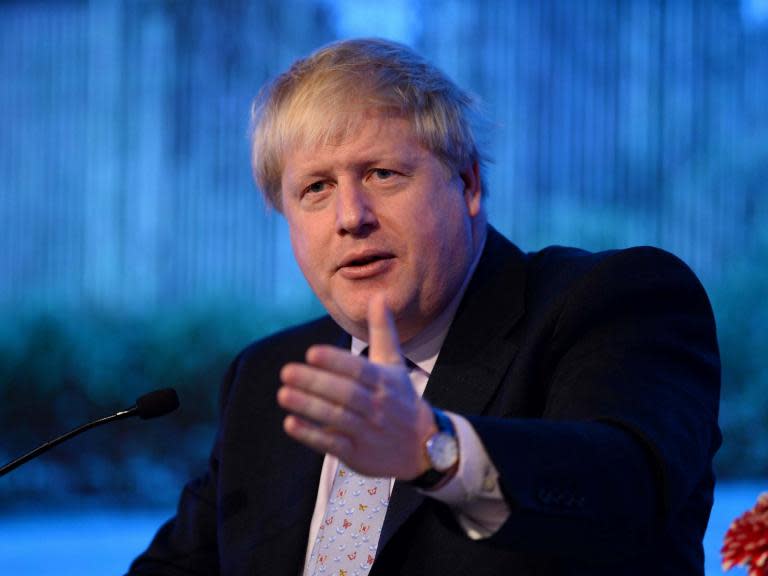Has Boris Johnson destroyed his premiership before it has even begun?
Boris Johnson began his leadership campaign by making a promise he cannot deliver. “We will leave the EU on 31 October, deal or no deal,” he said yesterday. He had to say it, because no candidate can expect to win the leadership election without such a pledge.
But I do not believe it is possible for any prime minister to take the UK out of the EU without a deal at the end of October. Johnson would be removed from office before he could do so. This may sound extreme, but it is a question of numbers.
The Conservatives with the DUP have a majority in the House of Commons of five, assuming Peterborough stays in opposition hands after the by-election the week after next. There are three Labour or former Labour MPs who support a no-deal exit: Kate Hoey, Kelvin Hopkins and Graham Stringer.
That means it would take only six Conservative MPs to deprive Johnson of his majority. There are many more than six Tory MPs who think a no-deal exit would be so damaging they are prepared to put country before party.
We can start with the six who have consistently voted against leaving the EU at all – let alone without a deal. Dominic Grieve was out and about yesterday saying that he would “take all steps necessary” to stop a no-deal exit. This group includes Jo Johnson, the putative prime minister’s brother, which sets up the intriguing possibility of a family drama even greater than that of David and Ed Miliband. Would Jo vote to bring down Boris, just a few weeks after he entered No 10?
Perhaps the tie of fraternal loyalty would stay his hand, but there are many other Conservative MPs – some of them even in the cabinet – who would do whatever it took to avoid what they call a “disorderly exit” from the EU.
There has been much learned constitutional debate about how parliament could prevent a no-deal exit. Supporters of what they like to call a clean break or WTO Brexit were excited by an analysis by Maddy Thimont Jack of the Institute for Government that suggested it couldn’t be stopped.
This is a good example of how people see what they want to see. The article makes the point that it would be hard for Yvette Cooper and Oliver Letwin to repeat their constitutional innovation of legislating from the backbenches to require a prime minister to seek an extension to the Brexit timetable.
That device needs the government to table an amendable bill or motion. If the government doesn’t have any legislation it has to get through, the Cooper-Letwin process can’t start.
But the article also makes clear that there is a more drastic option, which is to depose a prime minister by passing a vote of no confidence in the government. It doesn’t go into detail about what could happen next, so let me outline a possible scenario.
If prime minister Johnson were intending to allow our EU membership to expire on 31 October without a deal, he could be removed by six, or 10, or 20 Conservatives voting with Jeremy Corbyn on a motion of no confidence. This would not lead straight away to a general election: under the Fixed-term Parliaments Act, the Commons would have 14 days to pass a motion of confidence in an alternative government.
This could be a government of national unity led by, say, David Lidington, Kenneth Clarke or – just for the TV rights – Jo Johnson. The new prime minister would be installed by the Commons for the sole purpose of seeking a further extension of the Article 50 deadline.
It may be objected that Corbyn would never whip his MPs to put a Conservative in power, but if it were the only way to stop a no-deal exit I think he would do it. Not only did Labour’s manifesto say “leaving the EU with ‘no deal’ is the worst possible deal for Britain”, but ousting Boris Johnson feels like a Labour win that could bring a general election nearer.
In any case, the scenario is credible enough to scare Johnson. The choice facing him – or any other no-deal prime minister – would then be to prevent parliament from sitting, allowing the UK to leave by default on 31 October, or to ask for an extension himself.
Again, there has been learned constitutional debate about how prime minister Johnson could prorogue parliament, or refuse to set a date for it to sit, so that MPs would be powerless to stop him taking the country out of the EU without a deal.
These are dangerous waters. I find it hard to believe that it is being seriously suggested that a prime minister should suspend parliamentary democracy to do something as important as this in defiance of a majority in the House of Commons.
Whatever anyone’s doubts about Boris Johnson’s qualities as a potential prime minister, I do not believe he would try to subvert the will of parliament.
No: he will find himself on the same treadmill of unrealistic promises as Theresa May. He will try and fail to renegotiate the deal. The DUP will remain opposed. The Tory party will become increasingly wedded to an outcome that cannot be delivered.
He won’t be able to call a general election, because Tory MPs, fearful of losing their seats, won’t let him. In the end, he may be driven to a referendum, but even then the Commons could refuse to allow a no-deal exit as one of the options on the ballot paper.
It is a good thing Johnson believes that by sheer force of personality he can change reality, because it seems all roads ahead are blocked, not just for him but for any other possible Tory prime minister.



